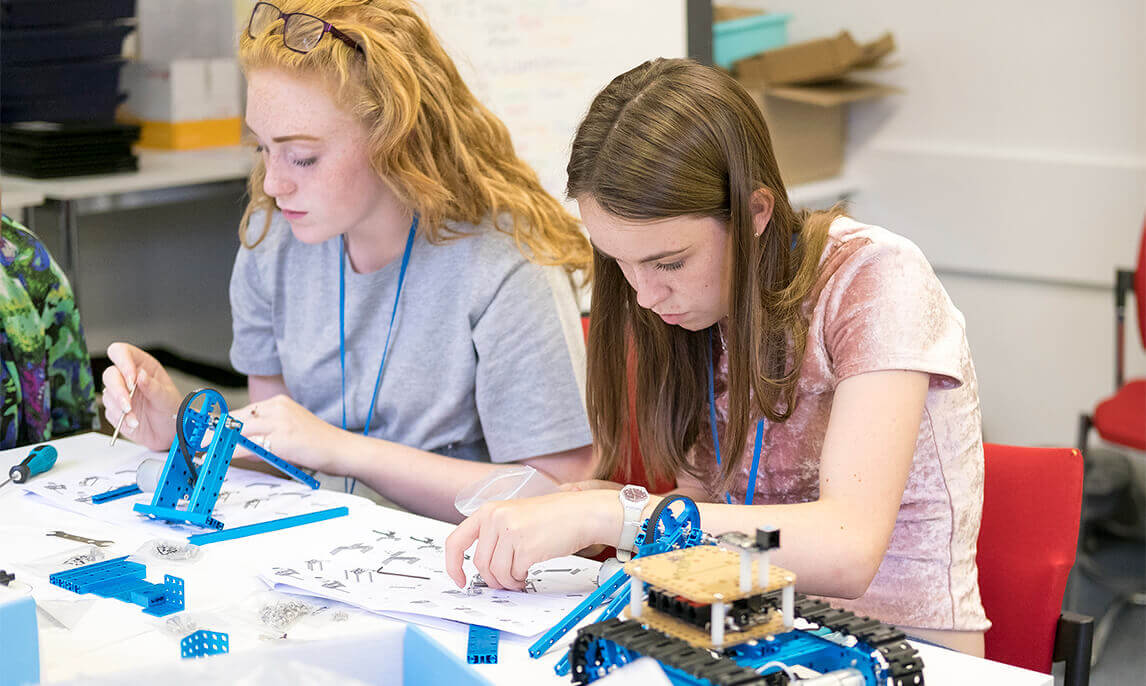In the past 20 years the perception of women in the engineering industry has certainly changed for the better, however there is still much work to be done. While women are becoming less of a novelty compared to male peers and taking up more key engineering roles, still just 12 per cent of women make up the engineering workforce today. This problem is even more worrying when we consider that we need two million more engineers by 2025 to meet the growing demand.
So while we should celebrate our progress as a sector, we also need to look ahead at ways to encourage more inclusion and diversity in the workforce, and in turn, grow our pipeline of future talented engineers.
Why do girls lack confidence in STEM?
There is no doubt that girls are just as capable and passionate about STEM subjects as their male peers. The problem is that many lack confidence in their abilities and falsely believe that a STEM career isn’t attainable for girls.
Breaking down the misconceptions around engineering for girls must begin as early as possible in a child’s education, so that we can improve their confidence and raise aspirations for a career in engineering. At our Leonardo site in Luton, we run an outreach programme that engages students with engineering from primary school age all the way through to university age. From feedback we’ve had from students locally, many girls still see engineering as ‘dirty’ and a ‘man’s job’, while others don’t see a career in engineering as even an option for them.
Indeed, a study by the DfE found that GCSE-age girls are less likely to consider themselves ‘good’ at a STEM subject than boys: 33 per cent compared to 59 per cent of males, and yet many studies show that on average, girls perform better than boys. It is easy to see how these misconceptions prevent girls from pursuing subjects such as engineering at a higher education level.
Misconceptions of what it means to be an engineer, a lack of visible female role models and exposure to engineering experiences, can all discourage girls from aspiring to an engineering career. This has to change.
We need to dispel these negative stereotypes and widen the access pool to opportunities not only for girls but for young people from different socio-economic and ethnic backgrounds, in order to improve diversity in the sector.
My belief is that overcoming these obstacles must begin from within the industry. It is essential that engineering firms utilise their resources and expertise to provide practical experiences and mentorship for young people, which shows just how diverse, exciting and rewarding a career in engineering can be.
How can we spark and sustain a passion for engineering amongst girls?
There is no doubt that engineering companies like ours want to make a difference and support the next generation of engineers. Whether a company’s objective is to engage with new, young talent as potential new members of their team, or whether it’s part of their corporate social responsibility programme, understanding how to start engaging with young people can be a challenge. There are some fantastic organisations in the sector who provide programmes in schools to get more young people included in, and excited about, STEM. Partnerships can therefore be an effective way for engineering firms to support these initiatives and reach a wider pool of young people. We began working with children’s education charity, The Smallpeice Trust, who offer wonderful opportunities for future engineering talent through their Arkwright Engineering Scholarships, STEM activity days in schools and residential courses, for just that reason.
Continued engagement for young people
Our programme of STEM events, work experience and careers talks in schools and universities means we can give students real insight into the everyday life of an engineer and dispel some of the misconceptions around STEM. While this has been effective at engaging students in the short-term, the challenge we face is in sustaining that passion for STEM throughout a pupil’s education journey. We have noticed for instance that we had gaps in our programme that coincided with key turning points in that journey.
We therefore decided to partner with The Smallpeice Trust to provide a wider range of STEM activity days and residential courses, starting with younger students and continuing through to GCSE and A-level age, to provide a programme of continued engagement. Working together with likeminded organisations means that we can extend our activities and reach a more diverse range of schools and students, who might otherwise have missed the opportunity to meet real-life engineers.
Building confidence through first-hand experience
Collaborating with partners such as The Smallpeice Trust also enables us to provide more engineering events exclusively for girls. We run a number of activity days in primary and secondary schools to celebrate International Women in Engineering Day each June, as well as supporting the Smallpeice ‘Girls into Engineering’ residential course. Students get the opportunity to design, build and test their own high-tech devices, from rockets to cracking cyber codes, with budgets and timescales to give them a sense of real-world application.
These events are a fantastic way to challenge misconceptions around STEM. The girls get to take ownership of a real-life engineering project, enriching their STEM knowledge as well as their creativity and problem-solving abilities. We also provide them with the opportunity of meeting female members of our staff so they can see that there is potential for them in engineering. Such opportunities are invaluable for instilling confidence and showing the girls that no matter the field, from aerospace to medical engineering, their potential is limitless.
We also host family events where parents can work alongside their children on a ‘design and make’ engineering project, helping to challenge some of the misconceptions which parents might have around girls working in engineering.
As you can see, our involvement is flexible. Our partnership with The Smallpeice Trust is a positive relationship that means we can agree the initiatives that best align with our business.
Getting creative in the Covid-19 pandemic
The current pandemic has made it a challenge for many engineering firms to continue some of their outreach programmes, Leonardo included. However, it’s more important than ever that we get creative and find new ways to reach students during this period to ensure they do not miss out on vital STEM learning.
While some students are back in school as part of the Government’s phased return others are still remote learning. It is a difficult time for everyone, especially as many subject-specific teachers might not be in school to help students with STEM-based learning. Engineering activities which require minimal teacher instruction and resources are therefore a great option for students both in school and at home.
Working with The Smallpeice Trust, we therefore donated engineering-based activity kits to local schools so that students could continue their engagement in STEM by building their own powered gliders. Students get to experiment and develop their own ideas, which helps to engage their curiosity and improve their understanding of complex engineering concepts. Companies might look at hosting virtual courses so young people can continue to develop their STEM skills at home over the summer and fill in any knowledge gaps.
Improving visibility of role models
Women are increasingly being recognised for their valuable contributions to the STEM industry, however female STEM role models are still not celebrated enough. Indeed, visibility of STEM role models generally is still fairly low, with few names that students recognise. How can we expect students, particularly girls and students from BAME or disadvantaged backgrounds, to aspire to a career in engineering, if they cannot readily see role models who look like them or reflect their own experiences?
We have brilliant female engineers in this country and showcasing their talent and their stories will undoubtedly help inspire more young girls and women into the industry. At a local level, engineering firms can help by taking their own female ambassadors back into schools and having them lead STEM activity days, to increase awareness and raise aspirations.
The engineering industry is a dynamic and rewarding field to work in because it allows you to make a positive impact on real-life issues, something which the current pandemic has demonstrated. The brighter future of tomorrow therefore depends on encouraging young people from all backgrounds to aspire to an engineering career today. Through engaging students early on and giving them the chance to work on real-life projects, there is every chance that they could discover a lifelong passion for engineering. It is up to us as engineers, engineering companies and organisations to work together to overcome the engineering shortfall and inspire more girls into engineering.








